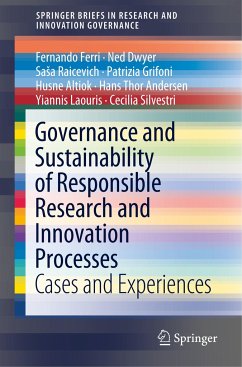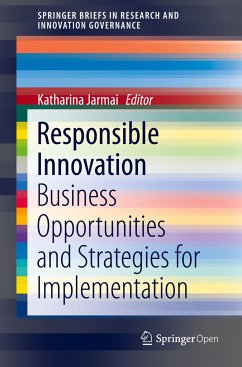
Putting Responsible Research and Innovation into Practice
A Multi-Stakeholder Approach
Herausgegeben: Blok, Vincent
Versandkostenfrei!
Versandfertig in 6-10 Tagen
31,99 €
inkl. MwSt.

PAYBACK Punkte
16 °P sammeln!
This Open Access book builds on the experiences of one of the largest European projects in the domain of responsible Research and Innovation: NewHoRRIzon. It highlights the potential of and opportunity in responsible R&I to conduct innovation in a socially responsible way. Employing the methodology of Social Labs, the book analyses responsible R&I from an experience-based viewpoint and further explores the application of responsible R&I beyond scholarly and industrial interests. The contributors analyze the current European R&I landscape, provide reflection and reconceptualization of its core ...
This Open Access book builds on the experiences of one of the largest European projects in the domain of responsible Research and Innovation: NewHoRRIzon. It highlights the potential of and opportunity in responsible R&I to conduct innovation in a socially responsible way. Employing the methodology of Social Labs, the book analyses responsible R&I from an experience-based viewpoint and further explores the application of responsible R&I beyond scholarly and industrial interests. The contributors analyze the current European R&I landscape, provide reflection and reconceptualization of its core concepts, and project future challenges in relation to responsible R&I. The book complements the readers' line of work by providing insights on how responsible R&I can be applied by the audience, for example, in their decision-making processes.












